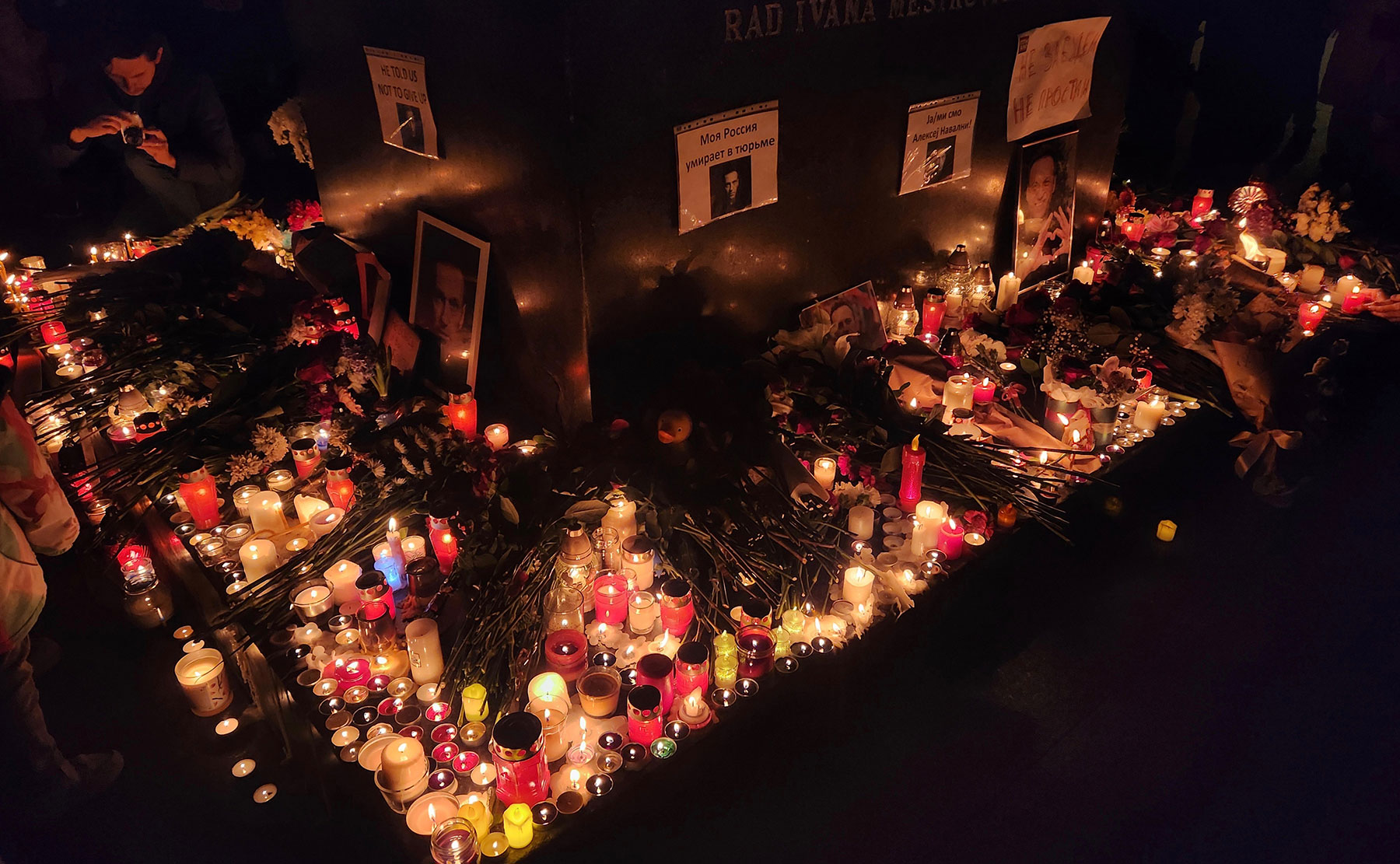On the Meaning of Toska
By Amy Satterthwaite Pappas
Vladimir Putin fidgets with his left leg, fallen stiff during this second televised hour he’s stared across at Tucker Carlson and suffered the indignity of questions from “the only Anglo-Saxon journalist” he’s agreed to meet with in years.
“When is the last time you spoke to Joe Biden?” Carlson asks him.
Putin makes a scornful puffing sound. “I don’t know,” he says. “Google it.”
A reply so curt, Putin is finished before the translator can begin dubbing the English. But I understand it. In Russian. Thanks to Rosetta Stone and Pinterest, I’ve learned how to say, “I don’t know” and “Fuck off” and many other useful phrases. “Google” is the same word in both languages.
Ya ne znayu. I don’t know. That I’ve understood Putin in his own tongue is a small triumph, finally, on a dubious quest begun in childhood.
Alexei Navalny will die within the fortnight, but I can’t know that as I watch, and rewatch, Putin and Carlson in early February. What I know is Alexei has said he much prefers his prison in the Arctic Circle to being holed up in solitary confinement in the city. He saw a polar bear on one of his walks. I am hungry for further news of him.
Shall we blame the oversized book of Russian fairy tales my parents read to me, with its dreamy illustrations of bears and princesses in snowy woods? Or watching a pigtailed sprite named Olga Korbut cartwheel across the balance beam, and wondering what her life was like behind a curtain made of iron back home with her gold medals and teddy bears?
There’s Tchaikovsky’s Nutcracker at Christmas. Swan Lake. Rachmaninoff. Epic novels by Tolstoy and Dostoevsky. A Chekhov play. A painted landscape by Kandinsky with a village steeple rising in the clearing of an ancient forest. Ya ne znayu, but somewhere along the way I lost my heart forever to this wintry, mysterious land.
In 2019, I entered an essay contest hosted by an American travel agency launching a three-week tour from Mongolia to Moscow. They were going to film a travel video and wanted chatty Russophiles aboard. My essay was among 12 chosen. The agency would pay for everything but our flight to Ulaanbaatar. We were to leave in July of 2020, but Covid canceled the trip two years in a row. The agency wrote to ask if I was available in 2023. Yes! And then Russia invaded Ukraine.
They say Alexei collapsed after one of those walks he liked to take in the snowy prison yard. They say he looked “unwell.” But we see video of him not 24 hours before, standing and joking with a judge. He’s wan but not gravely ill. We accuse Putin of murder. I don’t return to my Russian lessons for days.
***
Tucker Carlson listens helplessly as Putin takes 45 minutes to describe 3,000 years of history between Ukraine and Mother Russia. Putin pauses once, to ask Carlson if he’s bored. “I understand you studied history in college, isn’t that right?”
Roused, Carlson nods and assures the Russian president that there’s nothing boring about the interview. A few days later, Putin describes Carlson as “surprisingly patient.” He also calls Carlson “a dangerous man,” but he means Carlson is dangerous to America, where they prefer to believe Russia is evil. Where they prefer to believe that Vladimir Putin, in his 24th year of being called either prime minister or president, is nothing more than a KGB thug hungry to expand his empire and silence his enemies.
“Fearmongering,” Putin calls it. “Anti-Russian hysteria.” Putin weaves a tale of Ukraine and Russia joined body, mind, and soul. He says he sent his troops marching in to stop a Nazi uprising in Ukraine that would have ruined the country had it taken hold. Putin makes it plain he hates Nazis worse than he hates Anglo-Saxon journalists.
Carlson asks Putin whether he plans on saving and/or invading any other neighbors. Romania? Poland? Where does it end?
Putin narrows his black eyes and pretends to be insulted. And then he declares on camera that he has zero designs on any other country. Had it not been Carlson reporting, Putin’s statement—whether truth or lie—would lead the front pages of newspapers across America. But all anyone wants to talk about is when Putin embarrasses Carlson by bringing up the time Carlson was turned down for a job by the CIA.
“It is good you weren’t hired there,” Putin says, his apple cheeks swollen in mirth. He knows, quite correctly, that it will be the first time most Americans hear about Carlson’s rejection. Putin settles into his hard-backed chair, certain he knows far more about us than we do about him.
Brave, inspiring, young—Alexei Navalny wanted Putin’s job and to nudge the Great Bear forward. They kept him off ballots, but his support only grew. They poisoned him with the nerve agent Novichok. In Germany, he relearned how to walk, talk and eat. Putin wouldn’t say or hear his name, called him “the Berlin clinic patient.” We say Alexei should have stayed in the West, where he was safer. He wanted to go home to rally his people. He was arrested upon arrival and never drew a free breath again.
***
I may not ever see Russia, may never learn to write Russian or translate the great novels. Their alphabet is a riot of upside down and catawampus letters, with a few numerals turned backward and also called letters in a deliberate attempt to discourage Anglo Saxons, I’m sure of it. But I will learn to speak it and understand it when I hear it. Fuck off is pronounced otva ‘li, by the way. I do a lesson on Rosetta Stone in the morning and repeat the same lesson at night. That’s why I’m hanging on Putin’s every word, even if my children compare him to Lord Voldemort speaking Parseltongue.
Languages have personalities, rhythms, vibes, even if you don’t understand the words.
German, for instance, sounds aggressive and authoritative. Achtung!
Chinese uses a rising, questioning tone, while Japanese sounds like a rock gathering speed and syllables as it tumbles downhill. Italian is bold and passionate. And Russian is pure toska.
An Eastern Slavic word, toska means a heavy-heartedness, a weariness pierced by anguish, as if the very language contains the centuries of hardship that have defined Russian history.
“Toska is imprinted in the Russian DNA,” says Elena Rodionov, a tourist guide from St. Petersburg. “You can be as optimistic as you wish, but it’s stuck inside of you. It’s closely tied to the suffering and self-doubt that are so dear to the Russian people.”
A YouTube search of Russians conversing bears this up. Sentences trail off, voices drop in a sort of sigh. You hear a resignation of circumstances beyond control. Their word for “woman,” for instance, is pronounced zhenschina, and when it’s spoken by a Russian, you can almost feel the labor pains and period aches. You can feel blood in that one word.
I’m intoxicated. I’ve never heard a language so painfully beautiful. I walk around my house, pointing at things I know the words for.
Sobaka brizhit! Dog runs.
Sobaka p’yet! Dog drinks.
My terrier, Huck, stars daily in a Russian version of Go, Dog. Go!
But now Alexei Navalny lies dead in the snow, and I’ve lost the heart to carry on with my lessons.
News of the plane crash in August that killed another enemy of Putin’s, this time Yevgeny Prigozhin, reached Alexei in prison. Then they came for Alexei, moving him in secret from one prison to the next, always farther away. They took him clear across Siberia, to frozen Khat and a prison called Polar Wolf. He joked that he’d need a fur hat and boots for his walks. Now we know those walks were in a kennel, three steps wide and 11 steps long. I think of a small basement in Yekaterinburg in 1918, called The House of Special Purpose. Did Alexei realize this was his final destination? Ya ne zenayu.
***
We were to stay two days in Yekaterinburg on my canceled Russian tour. The Bolsheviks burned the House of Special Purpose after they murdered Tsar Nicholas, Empress Alexandra, their five children, and a handful of servants in the basement there during the Russian Revolution. This I’ve known since childhood as well and seized upon with at least as much ardor as I ever gave to Russian gymnasts or ballets. I was once introduced to the youngest Romanov daughter, the Grand Duchess Anastasia herself, who had cheated death by escaping the Bolsheviks. She lived in Charlottesville, right around the corner from my grandparents. She was married to a professor at the University. We all know now that she was a fraud, but that tiny woman in her threadbare, trailing garments managed to convince many folks who should have known better. The real Anastasia Romanov died in the messiest mass assassination in modern history. In The House of Special Purpose.
The Romanovs and their servants were told to line up against the wall to pose for a picture before the soldiers had to move them again, in the middle of the night. Too many soldiers crowded around the family, and many of the soldiers were drunk. When they began to shoot, the room filled with so much gun smoke that no one could see or hear or aim. Bullets ricocheted off the royal jewels hidden in the family’s clothes. Moaning, bleeding people moved in the fog. When it cleared enough to see, the soldiers stabbed them to death with bayonets. The waiting truck the family had been told would take them to safety was loaded with their corpses instead and driven to the forest. Acid was poured on their faces. The soldiers were so drunk and disorganized they’d packed only one shovel.
I used to go over it all in my child’s mind, playing the part of a Bolshevik officer, because that way I’d live to tell it. Tsar Nicholas was a wicked man deaf to the suffering of his people; his wife, Alexandra, was complicit and corrupt. I would give the order that they be summarily executed for letting millions starve. Their servants, though, would be spared, as long they agreed to join the Revolution. The children would be exiled to America, though I knew that the heir, a sickly boy of 13, would die of hemophilia-related sepsis long before he could ever mount a challenge to the new order that had replaced them. I was a dark child, but my plan was solid.
***
Putin is two hours late meeting Carlson in a nondescript room at the Kremlin for the interview. The Russian president is often praised for promoting traditional values and for encouraging people to return to the Russian Orthodox Church. Carlson asks Putin if he goes to church.
Putin dithers for a while, which goes untranslated. Then he says, “No. God to me isn’t something that must happen in church or only in certain ways. It can happen anywhere.”
Carlson has a follow-up question. “Do you ever think about God when you’re bombing Ukraine?”
Putin’s shoulders lift, then fall, in a long, toska sigh. “No, I don’t think about God then.”
***
Amy Satterthwaite Pappas lived and wrote and raised two children in Fredericksburg, Virginia, before moving back home to the Charlottesville area in 2010. She fools around with writing and painting when she’s not fighting the wild woods from taking over her Crozet property.


